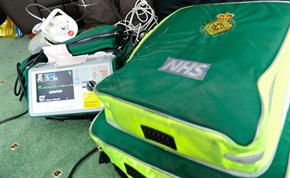Date:
19 April 2024
Page URL:
https://ntk.eastamb.nhs.uk/news/new-advice-on-treating-gastro-oesophageal-reflux-disease.htm?pr=
New advice on treating gastro-oesophageal reflux disease

The National Institute for Health and Care Excellence (NICE) has issued new advice to healthcare professionals to be alert to red flag symptoms, which may suggest gastro-oesophageal reflux disease (GORD) or other disorders.
Bringing up food is a common physiological process that usually happens after eating in healthy infants, children, and young people and does not require treatment.
However, GORD is so severe that medical treatment is required and NICE recommends that health professionals look for ‘red flag’ symptoms which may need further investigation or referral.
|
Symptoms and signs |
Possible diagnostic implications |
Suggested actions |
|
Frequent, forceful (projectile) vomiting |
May suggest hypertrophic pyloric stenosis in infants up to two months old |
Urgent transportation to hospital |
|
Abdominal distension, tenderness or palpable mass |
May suggest intestinal obstruction or another acute surgical condition |
Urgent transportation to hospital |
|
Chronic diarrhoea |
May suggest cow’s milk protein allergy (also see the NICE guideline on food allergy in children and young people) |
Specialist referral / transport to hospital |
|
Bulging fontanelle |
May suggest raised intracranial pressure, for example, due to meningitis (also see the NICE guideline on bacterial meningitis and meningococcal septicaemia) |
Specialist referral / transport to hospital |
|
Rapidly increasing head circumference (more than 1cm per week) Persistent morning headache, and vomiting worse in the morning |
May suggest raised intracranial pressure, for example, due to hydrocephalus or a brain tumour |
Specialist referral / transport to hospital – consider pre-alert if symptoms are severe enough. |
Routine investigation or treatment for GORD is unnecessary if a child or infant doesn’t have overt regurgitation and only presents with one of the following:
- unexplained feeding difficulties (for example, refusing to feed, gagging or choking)
- distressed behaviour
- faltering growth
- chronic cough
- hoarseness
- a single episode of pneumonia.
For more information or to read the full guidance, please visit the NICE website.
Published 14th February 2015
